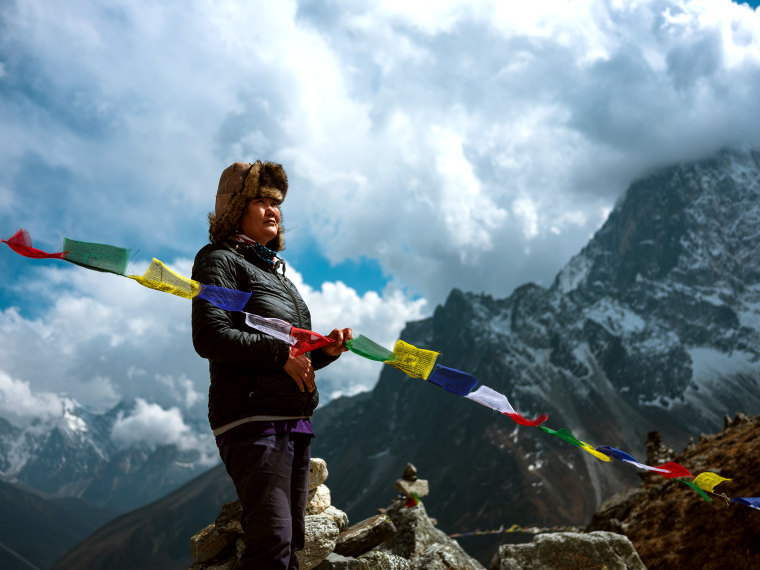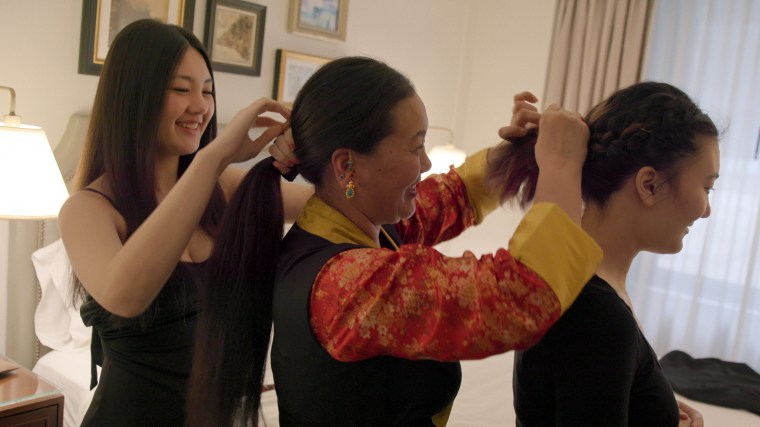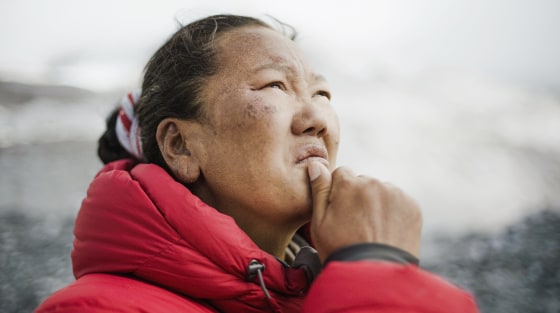Lhakpa Sherpa has conquered seemingly impossible mountains all her life — both literally and figuratively. And now, the 51 year old, who has climbed Mount Everest more than any other woman, is sharing her story in hopes of inspiring women and girls around the world to pursue their dreams and break glass ceilings.
“Life can sometimes be very hard. It’s not easy…But you can’t give up. Good things can come from bad,” Sherpa told Know Your Value.
Sherpa’s extraordinary life is chronicled in “Mountain Queen: The Summits of Lhakpa Sherpa,” which will be released on Netflix on July 31.
The documentary, directed by Lucy Walker, follows Sherpa on her tenth ascent of Mount Everest, when she was just shy of 50, as she attempted to break her own world record of summiting the tallest mountain above sea level.

The film also tells the story of her unconventional upbringing. Sherpa, the daughter of yak farmers was born in a cave in Nepal. She was fascinated with climbing as a young girl, even though society did not approve of girls going to school, let alone climbing mountains.
Still, she climbed (often disguising herself as a boy) and set world records. In the documentary, she tells the story of how she met her eventual husband, a Romanian climber named George Dijmarescu — and how that relationship imploded due to his drinking and abusive behavior.
In interviews, Sherpa details leaving her husband with no money, in hopes of securing better future — particularly for her daughters. The film shows Sherpa living in Connecticut and working at Whole Foods to make ends meet.
Even though she hadn't climbed in years, viewers watch a determined Sherpa return to Everest for a tenth time to redeem her life’s purpose and show her two teenage daughters that anything is possible.
Know Your Value recently spoke to Sherpa and Walker about the film. Below is the conversation, which has been edited for brevity and clarity.
Know Your Value: What was it about Lhakpa Sherpa's story that drew you in?
Walker: In a word, everything. I love making character-driven narrative longitudinal documentaries, the kind where you can follow the arc of a life and see the forces that shape it at work, to glimpse the machinery of how a life unfolds. And the characters that I love to follow are the kind of superhuman people who have special reserves of qualities like creativity, grace, courage, and resilience — Lhakpa has all four of those. I love documentaries that are as cinematic, visually and dramatically and emotionally compelling, as any scripted Hollywood movie. And I love telling stories that haven’t been told before. Lhakpa is unique as a protagonist, in what she overcomes in her childhood and in her culture and in her marriage, and in her motivation to climb.

Know Your Value: What do you hope viewers — particularly women facing their own difficult times -- take away from Lhakpa’s story
Walker: When Lhakpa was told “no”, she didn’t let that stop her. Her persistence, creativity and strength are magnificent to watch. Her story reads like a legend or a fairytale. Cutting off her hair to pass herself off as a boy in order to avoid arranged marriage and get a job on the mountain. Entering a running race to use the prize money to open a teahouse to support herself when she was an outcast as a young unwed mother, and spending years and years begging her customers to help her in her quest to become the first Nepali woman to summit and survive Everest, until, in what she describes as a moment of magic, one customer told her sure, come with me to the prime minister’s house, and the door to her future finally opened.
Know Your Value: Tell us about filming the current day scenes. Did you climb too? What were the biggest challenges?
Walker: Filming on Everest is challenging but I was confident about exactly how to do it because of my experience making my film Blindsight, for which I directed shoots covering two expeditions, one of which went up all the camps of Everest and into the death zone in order to climb the mountain next to Everest on the Tibet side, a 23,000’ mountain coincidentally called Lhakpa.
The breathtaking high altitude cinematography was captured by Matt Irving as well as by Lhakpa’s team of Sherpas who climbed with her. We gave everyone cameras and trained them because we wanted to see what shots they might see from their point of view. And I also knew that one camera and one cinematographer was not enough. We needed to be prepared in case the team split, or any one individual might have to descend at any time due to altitude illness etc.
I think what is challenging is to keep focused on story and emotion and drama, even though the backdrop is so diverting. The landscape always needed to contribute to the narrative, and not vice versa. But in a way it was equally challenging to capture the intimate scenes of the family. I am especially overjoyed with the scenes with Lhakpa’s teenage daughters at the end of the movie, especially because of how distressed and traumatized Lhakpa’s elder daughter was feeling after all that they had been through. At the beginning of the movie Lhakpa’s daughters are barely speaking to her, even though she had dedicated her life to inspiring and empowering women and girls. But as Lhakpa returns from her quest to Everest to reclaim her legacy, she has inspired her very own daughters. It was very delicate filming them, as I felt very concerned for their well being and not wanting to push them past where they were ready to go. I think I pushed them just the right amount, and it’s remarkable to watch the girls heal and grow thanks to the inspiration of their mom.
Know Your Value: Why do you climb? What do you love about it?
Sherpa: I grew up in the mountains and spent my childhood climbing. I wanted to explore.
I wanted to change my life. I wasn’t educated in a school. The mountains are my school. I’ve been mountain educated and I want to finish my degree. The mountains are my doctor, my healer. They make me mentally and physically strong.

Know Your Value: In the film we see you overcome many challenges — the physical and mental hardships of climbing to the top of Mount Everest, but also domestic abuse, being a single mom, and financial difficulties. What do you tell yourself when things get hard? How do you get through those times?
Sherpa: Life is a challenge. I was hurt from the divorce and you have to focus on the positive. You have to stay strong mentally and physically. We need the negative and positive to balance out our lives but we must focus on the positives. The mountains can also help heal. People will experience divorce, lose a business, suffer an illness…Nature can help you in a different way. Nature and happiness can love our body back. Nature is power. Nature can help you recover. Everyone is different. Some people will become a doctor, a lawyer, a pilot. Whatever it is that you want to do in life, even if it’s not easy. Keep doing it. You can reach the top of your Mt. Everest.
Know Your Value: Do you have another mountain you are hoping to climb? What’s your next challenge?
I have a goal to climb the highest mountain in each of the 50 states. My daughters have come with me on some of the climbs already. We’ve done nine states so far.
